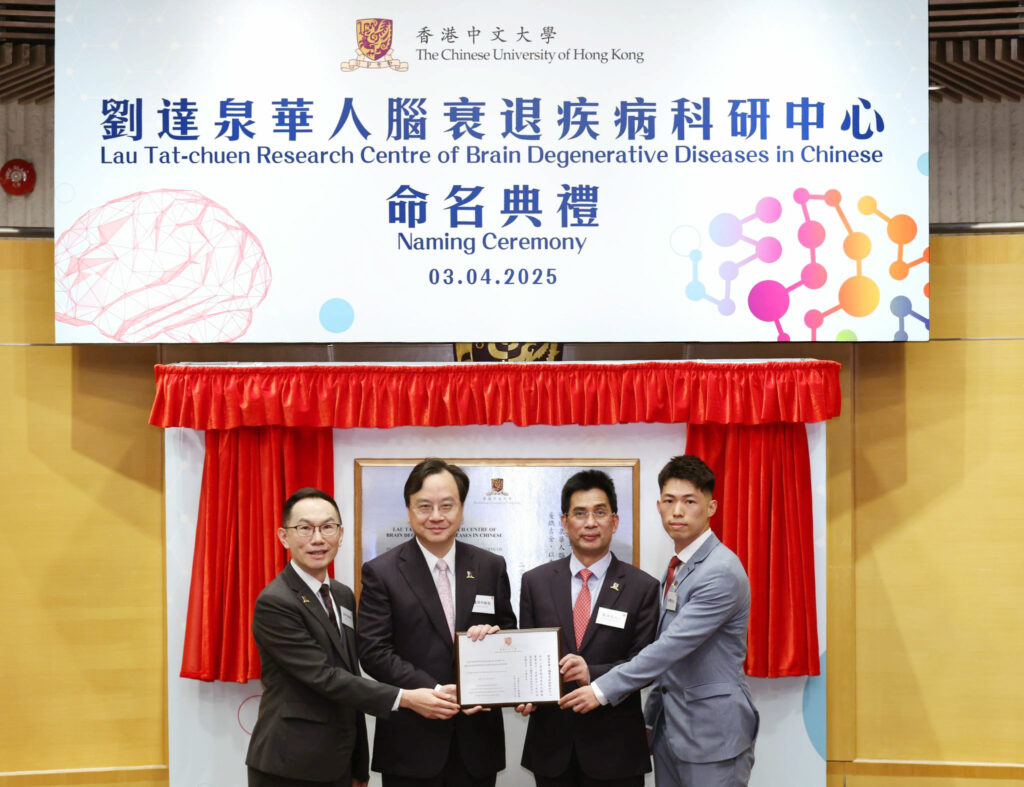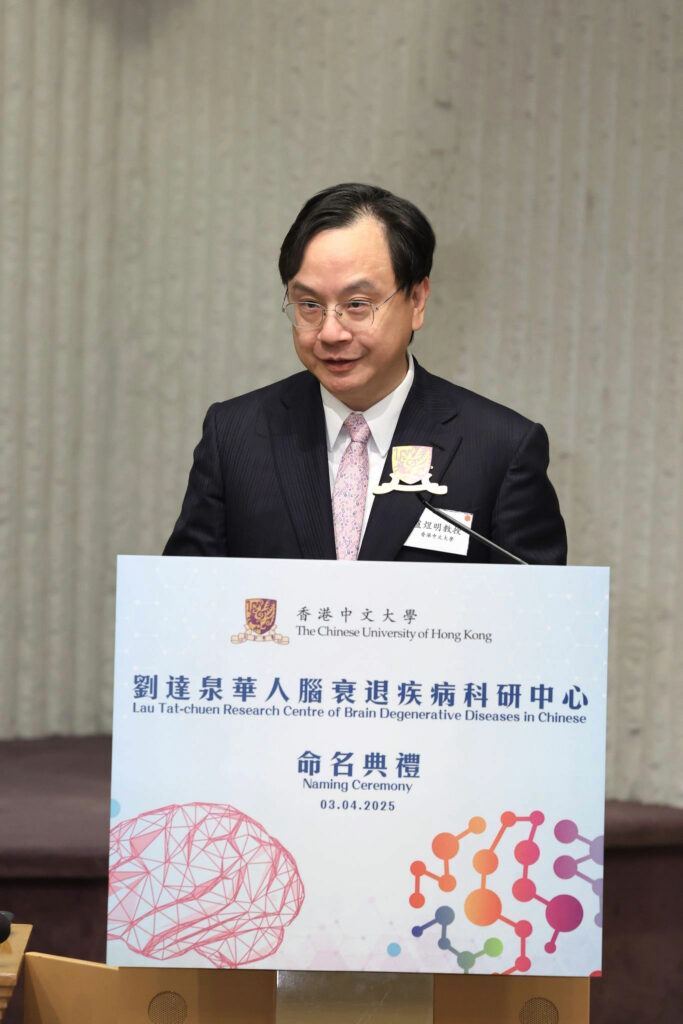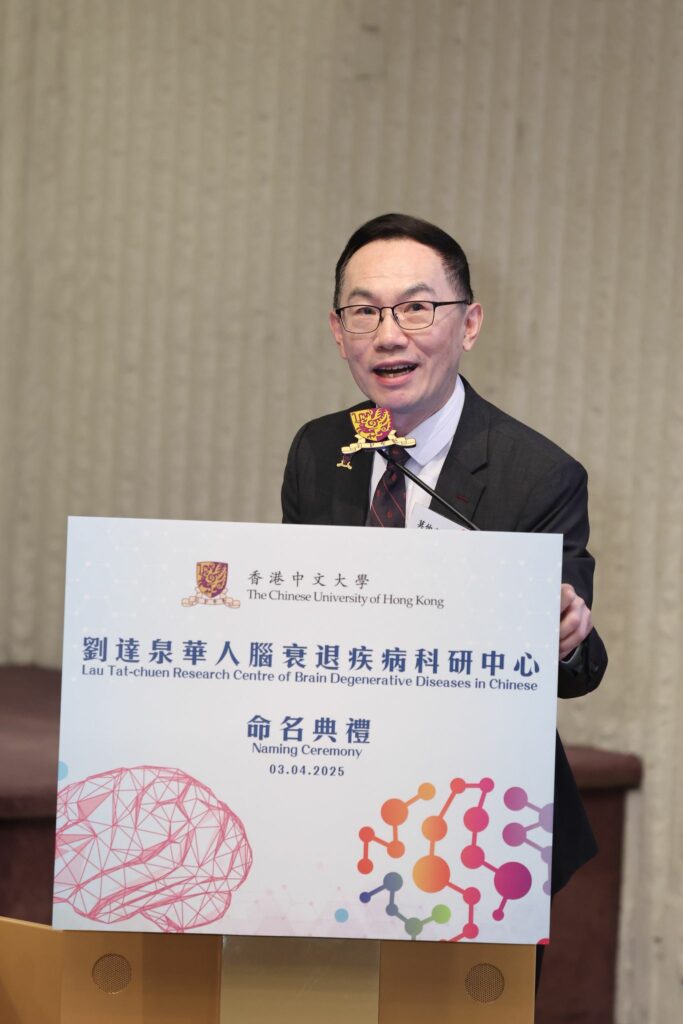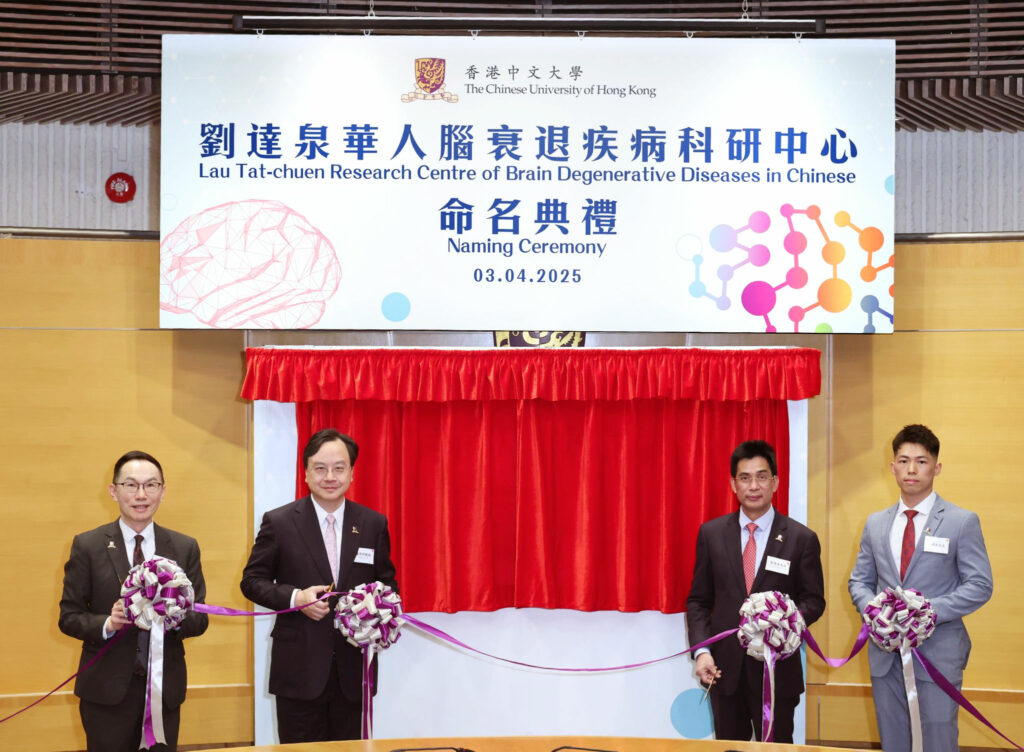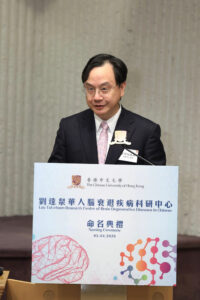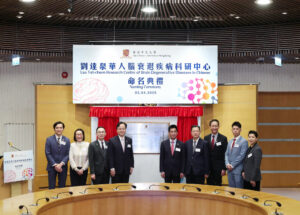CUHK
News Centre
CUHK establishes the Lau Tat-chuen Research Centre of Brain Degenerative Diseases in Chinese to develop strategies to tackle age-related brain diseases
The Chinese University of Hong Kong (CUHK) hosted the naming ceremony of the Lau Tat-chuen Research Centre of Brain Degenerative Diseases in Chinese (the Centre) recently. With a generous donation from Mr Lau Tat-chuen, the Centre is dedicated to developing innovative diagnostic methods and treatment strategies for common age-related brain diseases in the local Chinese population. The ceremony was officiated by Professor Dennis Lo Yuk-ming, Vice-Chancellor and President of CUHK; Mr Lau Tat-chuen, Chairman of Sino International Industrial Limited; Mr Alex Lau Yiu-tung; and Professor Vincent Mok Chung-tong, Director of the Centre and Mok Hing Yiu Professor of Medicine in the Department of Medicine and Therapeutics of CUHK’s Faculty of Medicine (CU Medicine).
Addressing the growing burden of age-related brain diseases in Hong Kong
Common brain degenerative diseases, including Alzheimer’s disease (AD) and cerebral small vessel disease (SVD), significantly impact an individual’s cognitive and motor function, functional independence, quality of life and lifespan. Ageing is the primary risk factor associated with these diseases. With Hong Kong’s rapidly ageing population, the prevalence of these brain diseases is expected to double or triple in the next 30 years. Therefore, developing effective preventive strategies is of critical importance to Hong Kong, our nation, and the global community.
Mr Lau Tat-chuen has entrusted CUHK to establish the Centre to further enhance research and therapeutic development for age-related brain diseases. The Centre will launch large-scale projects aimed at developing simple and accessible screening strategies for early AD and SVD in Chinese people and investigating the effectiveness and safety of an anti-diabetic drug in slowing early SVD progression. Findings from these projects hold the potential to reduce the increasing burden associated with common age-related brain diseases in our rapidly ageing society.
Professor Lo expressed his gratitude to Mr Lau and said: “We extend our heartfelt gratitude to Mr Lau for his invaluable support in establishing the Centre. Together, we shall advance research on brain degeneration and contribute to the understanding of Alzheimer’s disease among the Chinese population. We aspire for the Centre to pioneer new research exploration and popularise new diagnostic methods, enabling patients to receive timely treatment. Additionally, we aim to enhance public awareness of dementia and encourage attention to brain health.”
Developing affordable and accessible diagnostic methods for early AD and SVD detection
Studies over the past decades have shown that the pathological changes of AD and SVD evolve in ageing brains for years to decades, leading to secondary brain degeneration and eventual development of disabling symptoms such as dementia. Recent clinical studies have shown that through early identification of and intervention in individuals harbouring these pathological brain changes at the subclinical or mildly symptomatic stage, progression of the diseases and related symptoms may be slowed down.
While current detection methods, such as positron emission tomography (PET) and cerebrospinal fluid (CSF) analysis are accurate in the detection of AD, they remain costly, invasive and inaccessible for widespread clinical use. While MRI is able to detect SVD, it is still costly and less accessible. To address these challenges, a research team from CU Medicine is collaborating with the Shenzhen Bay Laboratory to develop simple, safe, accessible biomarkers for brain health assessment, early detection of AD and SVD, and the monitoring of disease progression and treatment effectiveness.
Professor Mok explained: “Our Centre will establish a Chinese cohort aged 50 to 85 with mild cognitive symptoms. Among the various clinical, multi-modal imaging (retinal, MRI, PET), and plasma data collected, we will first focus in utilising advanced AI technology in developing novel AI models based on retinal imaging data for the detection of early AD and SVD. The retina is an extension of the brain and brain changes associated with AD and SVD are also reflected in the retina. Developing state-of-art AI model based on retinal pictures taken through a simple fundus camera is probably the most affordable and accessible method that can facilitate earlier detection and treatment of AD and SVD in the community, and potentially delaying the onset of dementia.”
Developing novel therapeutics for SVD
In the area of cerebral SVD treatment, the Centre will strategically explore the innovative approach of drug re-purposing. SVD elevates the risk of developing many symptoms that are commonly seen among older people, such as dementia, gait disturbance and depressive mood, and also increases the risk of stroke and AD. To date, specific pharmacological therapy for SVD is still not available.
Recent animal studies from CU Medicine have shown that a particular class of anti-diabetic drug, glucagon-like peptide 1 receptor agonist (GLP-1 RA), is able to reverse ageing-related SVD. Clinical trials are urgently warranted to clarify whether re-purposing the drug can effectively slow down SVD progression. To this end, the Centre will investigate its efficacy and safety in doing so, alleviating the escalating burden of common age-related brain diseases in our ageing society.
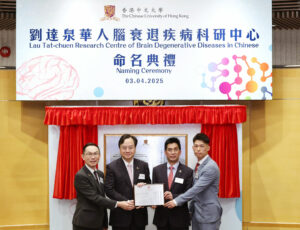
CUHK hosts the naming ceremony of the Lau Tat-chuen Research Centre of Brain Degenerative Diseases in Chinese.
Professor Dennis Lo Yuk-ming (2nd left), Vice-Chancellor and President of CUHK; Mr Lau Tat-chuen (2nd right), Chairman of Sino International Industrial Limited; Mr Alex Lau Yiu-tung (1st right); and Professor Vincent Mok Chung-tong (1st left), Director of the Centre and Mok Hing Yiu Professor of Medicine in the Department of Medicine and Therapeutics of CUHK’s Faculty of Medicine
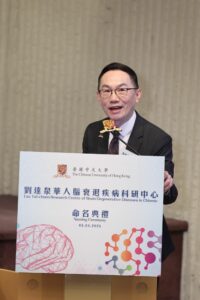
Professor Vincent Mok Chung-tong, Director of the Centre and Mok Hing Yiu Professor of Medicine in the Department of Medicine and Therapeutics of CUHK’s Faculty of Medicine, delivers a speech.
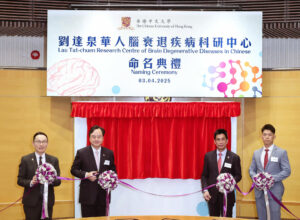
CUHK hosts the naming ceremony of the Lau Tat-chuen Research Centre of Brain Degenerative Diseases in Chinese.
Professor Dennis Lo Yuk-ming (2nd left), Vice-Chancellor and President of CUHK; Mr Lau Tat-chuen (2nd right), Chairman of Sino International Industrial Limited; Mr Alex Lau Yiu-tung (1st right); and Professor Vincent Mok Chung-tong (1st left), Director of the Centre and Mok Hing Yiu Professor of Medicine in the Department of Medicine and Therapeutics of CUHK’s Faculty of Medicine


